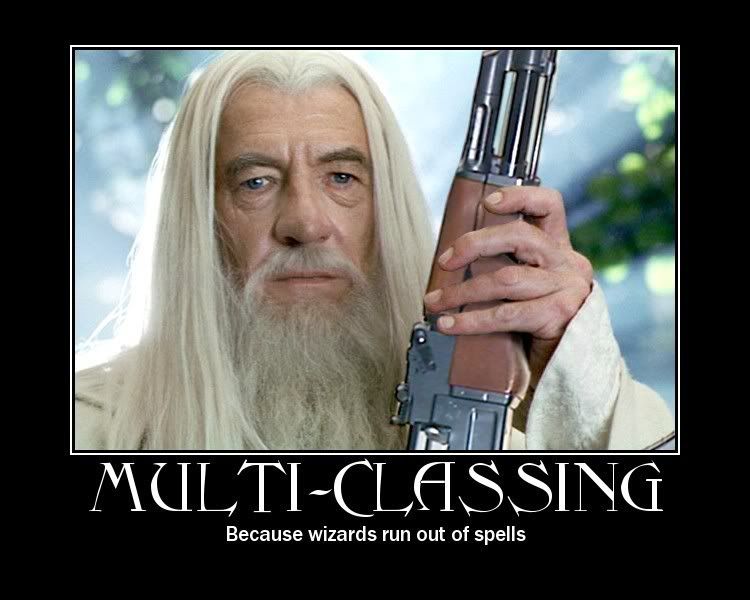With a first session of a campaign coming up this week, and a few that I'll be running within the month, my mind has been meditating on beginnings. Beginnings of campaigns in particular, but also beginnings in general.
Everything has a starting point, not only works of fiction, but life, stages of life, relationships, projects. The list goes on. Sometimes the starting point is buried in the dust, forgotten, or seemingly insignificant, but it is always the most important piece. Without it, nothing would be.
I don't mean to get weirdly philosophical on an RP blog, but it's something to knock around the noggin a little bit.
So, let's take a look at the beginnings of campaigns. How do first sessions usually go? Where do they start? What sorts of opening scenes work best? Is there criteria for judging whether or not it should be continued for another session?
Stuff like that.
From my personal experience, where a campaign starts really depends on the group's preparation before hand. Is everyone coming in with characters they created on their own or with the GM? Has this group met before hand to discuss anything? Have they even met before? Did the GM set any sort of guidelines? These are the variables that determine really where you can jump in.
Most groups, I've noticed, are cobbled together from whatever characters the individuals wanted to play with little connection to one another that are thrown together as a consequence of circumstance or because of one common link. Therefore, a beginning session's first job in this sort of scenario is to find a way to force these potentially dissonant characters together to do something, usually follow the plot-train that the GM has set tracks for. Either that, or the group is thrown under a common banner, 'Adventure Party', 'Mercenary Band', what have you, and you work under the assumption that you all just work together. To adventure. Or make money. Or something.
The beginnings to this kind of campaigns are usually rather classic and quaint. An old man in the tavern gives your adventure party a quest or mission to find the macguffin, save the macguffin, or defeat Lord MacGuffin the Scotsman. You are all in prison, and there's a prison riot or break and you can only escape by working together. The transport you all are riding is under attack and you are the only able-bodied, combat-ready people in the area. There's a bank robbery and you are the only superheroes in the area because the main ones are in space.
(We've all met this guy)
And, if this sounds like every campaign you've ever been in, that's fine!
But, there is another way. In my opinion, it's a better way, but that wholly depends on preference, your group, and the game you are running, of course.
My favorite RP podcast is called 'Fear the Boot', and they have come up with something called the 'Group Template.' This is a basic document that outlines clearly what the group is, who they are, how they are connected, and what their goals are. They fill this document out before every campaign, and they create their characters together. If I remember right, they don't come to the table with solid concepts in mind. The GM sets some guidelines, and the group creates and envisions their characters together while creating connections along the way and setting up a reason for being together and goals.
I will tell you from experience, this radically changes the quality of every first session I have ever ran.
Like, literally, day and night.
Now a GM is not confined to slapping together characters that don't work following a plot train that may not even be suited for the group. You can have any beginning you can think of without having to rely on cliches in order to bring the party together. Sure, there are plenty of cliches that can still be used, such as the group summon by an important figure, but you can think outside the box a little. Say the group template is a bunch of professional thieves, each having their own specialty. You can start the campaign in the middle of a heist! Set up some parameters, and the characters will do their own thing because they have goals and the skills to meet them. Maybe something goes wrong, an inciting incident of sorts, and the characters will be motivated to follow up on it because it had to do with something they were striving for on their own initiative, not because some important NPC said that they should care.
Just something to think about.
So, whether the group is cobbled together or nitpickingly planned to the last detail, the first session is here. How to begin? What is Act 1: Scene: 1?
Again, there seems to be a split in tactics, one I prefer and one I like a little less. It usually boils down to whether it starts with action or starts with drama.
Since I like the X-Men so much, let's use them as an example.
Does the campaign start with a Danger Room session, or a scene where they are debating mutant rights before congress? Is someone attacking the mansion after the Danger Room, or assaulting the congressional meeting? Does someone's powers freak out at the wrong time and cause something terrible to happen?
These are all ways an X-Men campaign could start, potentially.
Is it better to start out with action or drama? Both?
I can see great justifications for both, which I elaborate on here.
Start out with an action scene if the group is not completely familiar or comfortable with the rules. Since most of the rules cover how to handle moments of action, this is a great place to clear up any misconceptions and make sure everyone knows how to play. It could also engage players who are more combat inclined and get them interested from the get-go as opposed to having them set through dialogue, which they'd rather not do. Inciting incidents are also great in the middle of action scenes, and it's a wonderful way to give everyone a little glimmer of spotlight before the plot train begins moving.
However, start out with drama if you want your players to be comfortable in their own character's skins and create inter-group relationships early on. It doesn't even have to be anything terribly dramatic. Hell, I love starting campaigns at a point where it's a party. How does your character interact in a surprise party for another character? Or a fancy dinner? This gives the players a chance to get a feel for how their character acts, interacts, talks, feels, etc. It can also be a great place to set up themes, tones, motifs, and other things that will make sense or be significant later on. However, don't linger too long if you have player's who are action minded, or else they will probably be terribly bored.
You can probably tell that I favor the second option, but that's just because of how I run games and how I like to play.
And there's no reason you can't mix the two, a little drama before the action, a little action after the drama. In fact, that is usually the best way to please everybody involved.
So, first scene is over, we're in the thick of the inciting incident, and the session is going to wrap up soon. What sorts of things are you as the GM going to be looking for? What are you as a player expecting by the time the dice are collected and everyone shuffles into the driveway or goes to play video games?
As a GM, I would look for the following things to see if the first session was a success:
-Did everyone get a moment to shine?
-Does everyone understand the setting?
-Does everyone understand their character?
-Was there enough to leave them wanting to come back for more?
And most importantly...
-Did we have fun?
As a player, I would consider the following things to see whether I'd play again:
-Did I like the other players? (Because, if you didn't, you probably shouldn't game with 'em)
-Did the GM try his best? (Because no one's perfect, but sometimes you've just got a bad apple)
-Am I engaged/interested at all in what's going on in the plot, or in the characters? (Because, if not, that should be fixed)
And most importantly...
-Did I have fun?
You can debate all you'd like on that criteria, but that is what I usually mentally go through after a first session, and that's important, because first sessions can sometimes make or break a campaign. Sure, you should give it another few sessions or so (time allowing) before making any sort of serious judgement, but sometimes an unresolved issue from session one can bite you in the ass down the road and tank a campaign.
Just sayin'.
Anyway, those are my thoughts on first sessions. It is an interesting beast, to be sure, but like I said in the beginning, they are necessary for gaming to exist. Why not think about 'em a little bit? Maybe try something different?
I hope you liked my thoughts! If not, here's a funny picture.
-Wes






No comments:
Post a Comment